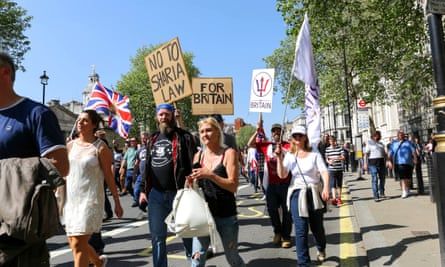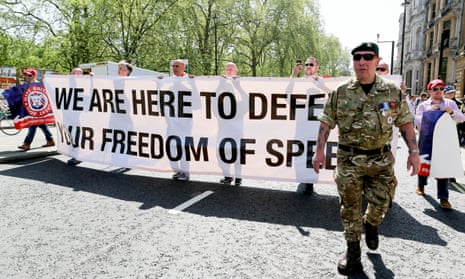Thousands marched through London under the banner of free speech on Sunday after Tommy Robinson, a former leader of the far-right English Defence League, was permanently banned from Twitter.
Protesters flying national flags and holding placards decrying limits to free expression rallied at Whitehall after marching through central London from Speakers’ Corner in Hyde Park, a location seen as emblematic of free speech that has been the scene of several recent far-right rallies.
Robinson called for the demonstration last week in response to Twitter’s decision to ban him for “hateful conduct” after he posted a message saying: “Islam promotes killing people.”
He and several prominent rightwing figures addressed the 2,000-3,000 attendees. Robinson told the crowd: “We couldn’t have done this three years ago, we couldn’t have done this four years ago. We are now mainstream.”
Other speakers included the leader of Ukip, Gerard Batten, the Vice magazine co-founder Gavin McInnes, the YouTube personality Sargon of Akkad, Anne Marie Waters of the political party For Britain and the former Breitbart senior editor Milo Yiannopoulos.
Lines of police with riot vans separated the protesters from several hundred counter-protesters demonstrating against what they saw as a far-right movement.
As the crowds, swelled by support from the Democratic Football Lads Alliance (DFLA), an umbrella group for football ultras, turned from Piccadilly into Whitehall, they chanted Robinson’s name.
Paul Stevenson, 42, from Harrow, said he was marching to “protect freedom of speech”.

“It’s to protest against all the censorship that’s going on, political correctness, cultural Marxism and attacks on the white, Christian culture, not just in this country but across Europe,” he added.
Numbers dwindled throughout the lengthy Whitehall march, while the atmosphere was unthreatening.
In his rally speech, Robinson said: “The people of this country have been silenced for 20-30 years with the tag of racists. They have managed to silence people so that they are too scared to speak up when they see things that are wrong.
“They now realise that that tag is dead: no one cares anymore with being labelled racists.”
Yiannopoulos told the crowd: “Truth and righteousness are behind you. You are the vanguard, you are the dark nights, the first men and women to proudly stand with your heads above the parapet, caring nothing for the bullets that come your way and I salute you.
“I saw what happened when Nick Griffin went on Question Time, in America when genuine racists [appear on television] ... When those people are exposed to the harsh light of day, I believe that sunlight is the best disinfectant.”
Carl Benjamin, whose alias is Sargon of Akkad, said the protest was against “totalitarianism, identity politics and Islamism, which is really the same thing.”
“Those protesting against them were only in favour of ‘curated speech’,” Benjamin added.
On the other side of the lines, Freddi Hyde-Thompson, 28, from London, was shocked to find the counter-protesters outnumbered. “It’s really worrying ,” he said. “This cannot come to London and there be more of them than there are of us.”
Hyde-Thompson saw the protesters’ claims of support for free speech as a contradiction. “If their freedom of speech is going to rub out other people’s freedom of speech then they’ve got no point. If they want to ban certain religions, that speaks for itself.”
Among those watching the speakers and videos was Fatima, a black Muslim woman who would not give her full name.
“I’m here for freedom of speech,” she said, adding that she did not feel threatened. “It’s okay, I’m in my element; I don’t really care, this is England. There’s a guy with an infidels shirt right in front or me, I don’t know how he would react to me. This is a bit awkward for all of us.”
